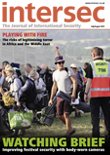Combating terror tourism
Following the recent shootings in Canada, Anthony Tucker-Jones asks what can be done to safeguard against radicalised expatriates and aspiring jihadists
Following the recent arrest of four men suspected of plotting attacks at Remembrance Sunday events in the UK and the killing of two soldiers in Canada, efforts to cope with home-grown Islamic radicals remains very much at the forefront of counter-terrorism polices in Western capitals. During the summer, the UK’s national threat level was cranked up to “severe” over mounting intelligence that “terror tourists”, or radicalised young Muslims, returning from jihad in Iraq and Syria with the Islamic State of Iraq and Syria (ISIS) pose a growing threat.
War tourists have long been a feature of distant wars – those who go to fight are either seen as idealised freedom fighters or just plan mercenaries. Whatever the ideology that motivates them, for some there is also a perverse glamour to being in a war zone and being a fighter for a just cause. It is noticeable how foreign volunteers always adopt the fighting fashions of their hosts – often to comical if ultimately deadly affect.
The Balkan wars attracted a hotchpotch of volunteers, who ranged from highly experienced former Special Forces soldiers to novices with no military experience; the latter often proved a liability to themselves and those around them. On the whole, though, those who survived did not return home to cause mischief – either a quite life beckoned or they embarked on further foreign adventures. Organisations such as Executive Outcomes ensured that those with real military expertise were never short of work.
Jihadists embarking on holy war – be it in Somalia with al-Shabaab or ISIS in Syria and Iraq – pose a whole different problem. The causes they fight for cannot be compartmentalised in the same way. Throughout the past summer, Western intelligence agencies, academics and the media spent a lot of time flagging up alarming estimates of the numbers of European Muslims travelling to Syria either to help with the mounting humanitarian crisis or to fight against government forces. These volunteers, on the whole, were joining the more militant groups opposed to Assad’s regime in Damascus.
The lack of decisive action by the EU or UN convinced some European Muslims that Western capitals were indifferent to the suffering of their co-religionists in Iraq and Syria. Such a view inevitably leads to a sense of rage, not only against the governments in Damascus and Baghdad but also against the governments of Europe and North America. Fuelled by such a grievance, the worry is how they react when they return to their home country.
One school of thought is that volunteers should be prevented from travelling to war zones, but clearly this approach could lead to a backlash, and freedom of movement is considered a central tenet of Western democracy. Similarly, it has been argued that individuals should not be allowed to return from abroad and should have their citizenship striped. Some counter-terrorism experts feel would-be jihadists should be allowed to go, but that authorities should monitor their destination/host organisation and then intervene when they return. At this point, radicals can be assessed as to whether the full weight of the law needs to fall down on them to protect the state or whether they should simply be sent back to their old humdrum existence.
Encouragingly, in the UK MI5 and the police are of the view that most of the 300 British jihadists who have come back from Iraq and Syria have returned peacefully to their everyday lives. Amongst them were Shahid Miah, 23, and Amed Mohamadi, two young men from Cardiff. Of course, this approach is only partially reassuring, as it only takes one or two people to perpetrate a terrorist atrocity. No matter how vigilant the authorities are, inevitably at some point someone slips through the safety net.
The British government has been developing a dual-track approach, seeking to create powers to exclude Britons from returning home and at the same time strengthen powers to seize passports in the first place. Following a Freedom of Information request made by The Times, figures have been released showing that, since January 2005, a total of 27 British citizens were prevented from travelling abroad by having their passports revoked under royal prerogative. What is sobering is that 23 of these related to people seeking to travel to Syria in the 12 months to August 2014. The other four were in 2005 and were in relation to men freed from Guantanamo Bay. The escalation of this practice has led to further concern, especially following the attacks in Canada by two men reported to have had their passports revoked to prevent them travelling to Syria.
While seeking to nip terror tourism in the bud, British authorities are trying to adopt a softer approach with returning jihadists. It has already been accepted that in some instances prisons are incubators of jihad and simply exacerbate the situation. The Channel programme is the government’s counter-radicalisation scheme that seeks to defuse radicalisation. In the past year this has seen the number of referrals increase from 748 to 1,281 – though the worry is that returning jihadists will view Channel as a get-out-of-jail option if they co-operate with the authorities and act suitably contrite.
In the case of Shahid Miah and Ahmed Mohammadi, the Wales Extremism and Counter Terrorism Unit assed the pair to be largely easily-led wanabees. Police intelligence showed they were susceptible to indoctrination – a recruiter’s dream – and were impressed by friends already serving with ISIS. This was borne out by two of their friends – Reyaad Khan, 21, and Naseer Muthana, 20 – the very Cardiff jihadists who in June appeared in the ISIS recruiting video urging British Muslims to join them and perform jihad.
Nonetheless, when assessing the threat posed by returning jihadists, a whole series of factors have to be considered. While prosecution and prison may be the best course for some hardliners, for others who have been led astray or are simply idealised youths out to change the world, a better route might be reintegration with the support of social and mental health services.
Canada now finds itself grappling with these very issues after Ottawa became the latest capital city to witness an attack by home-grown jihadists. The Canadian government has revealed that about 30 Canadians have travelled abroad to support ISIS. But the security authorities are currently monitoring at least 90 Canadians after they were assessed to be a potential threat to national security.
In October, 25-year-old Martin Coutre-Rouleau, 25, was shot after running down and killing a soldier with his car near Montreal. The case bears unpleasant similarities with the murder of British soldier Lee Rigby in Woolwich in 2013. Then Michael Zehaf-Bibeau, 32, shot a soldier in Ottawa before storming into the Canadian parliament building where he himself was shot dead. Both attackers were Islamic converts. In a cruel irony, Zehaf-Bibeau’s mother, Susan Bibeau, is the deputy chair of the immigration committee at the Immigration and Refugee Board of Canada. Likewise, Rouleau was one of those Canadians being monitored – in this instance having him under surveillance did no good.
These killings coincided with Canada’s announcement that it would send half a dozen jets to support US air strikes against ISIS fighters in Iraq. In addition, Canada’s Conservative government previously put a number of its Muslim citizens on a “watch list”, which proved controversial, and pledged to send 600 Special Forces along with the jet fighters to support Washington’s efforts to prop up Baghdad in the face of ISIS’s advances.
Canada’s legislators responded to the attacks, as in Britain and the US, with calls for ever-more restrictive laws. Stephen Harper, the Canadian Prime Minister, said he would push for new terror legislation and authorise wider surveillance of terror suspects. Many Canadians fear their government’s foreign policy has come home to roost. In 2003, Canada avoided sending troops to support the US-UK led war to oust Saddam Hussein. Subsequently, though, Canada sent troops to support combat operations in Afghanistan. It was then that Canadians began to appreciate the implications of being at war in a Muslim country.
Indeed, British and Canadian support for the US-led attempts to stem the ISIS tide in Iraq and Syria have resuscitated the view among elements of the Muslim community that the West is once again at war with Islam. Such a warped worldview is very seductive to young impressionable Muslims growing up in Western countries.
At the same time, what was disturbing about the attacks in Canada was that they targeted such emotive and symbolic cultural sites, namely Canada’s National War Memorial and Canada’s parliament building. It also showed that Canada is not immune to such attacks as those experienced by the US, the UK and France. Canada, along with the UK, is now looking for a workable solution to the problems caused by aspiring and returning jihadists – terror tourism remains big business but for all the wrong reasons.
Anthony Tucker-Jones is intersec’s Terrorism and Security Correspondent. He is a former defence intelligence officer and is now a widely published defence commentator specialising in regional conflicts and counter terrorism.









